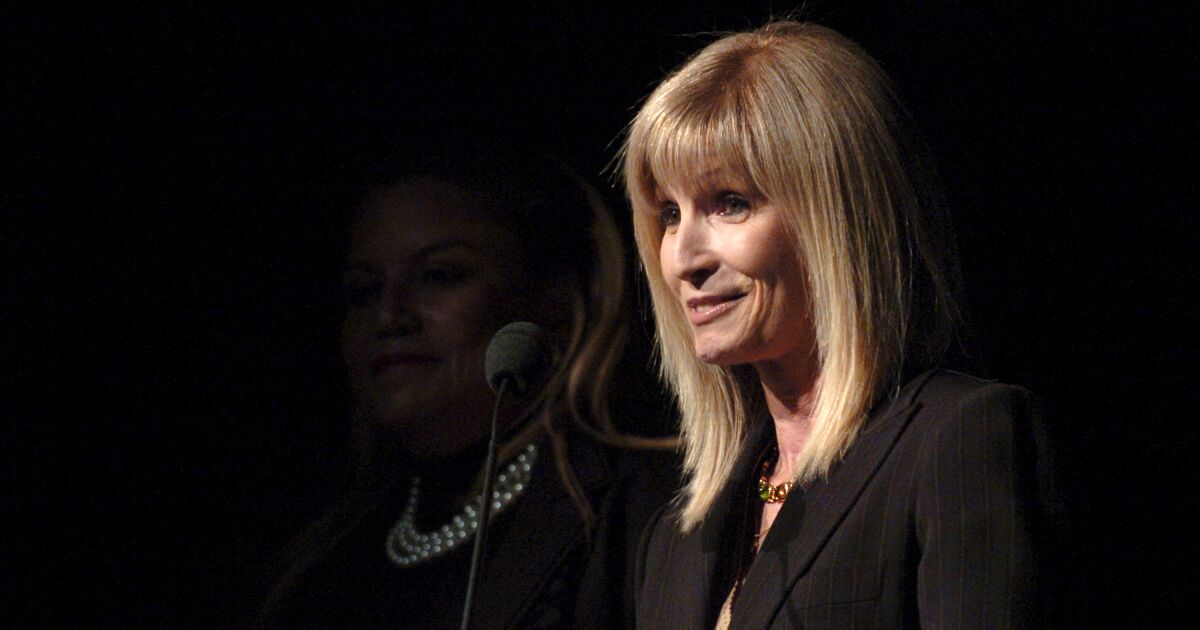
Mary Turner, considered the first lady of rock radio in Los Angeles on station KMET-FM, has died. She was 76.
Turner died Tuesday at her Beverly Hills home after a long battle with cancer, according to Jarrett Bostwick, executor of her estate.
Through the 1970s and early ‘80s, Turner was regarded as the most-listened-to female voice in radio. Known as “The Burner” — a moniker given to her by Peter Wolf of the J. Geils Band — she is best remembered by Los Angeles baby boomers for her years on KMET, the iconic FM outlet that was a must-listen for rock fans in the 1970s and ‘80s.
Turner was among the trailblazing women who received opportunities behind the microphone in the early 1970s after men had long dominated the radio business. Her chance came as FM rock music formats proliferated and offered an alternative to the tight playlists and rapid-fire style of top 40 AM stations.
Turner had two nationally syndicated programs on Westwood One, the company founded by her late husband, media executive Norman Pattiz, and broadcast to troops in 40 countries through the Armed Forces Radio and Television Service. She also hosted an in-flight music program for airline TWA. A Gallup research study in 1981 found that her voice was heard by 23.4 million people a week.
Turner was born in Maryland on Feb. 4, 1947. After graduating from Indiana University in the late 1960s, Turner hoped to pursue a career as a TV producer or director.
She moved to San Francisco, where she answered phones at Autumn Records, the label where Sly Stone toiled as a producer, and later landed a job in the promotion department of local TV station KNEW. She eventually moved to KSAN-FM, the station programmed by Tom Donahue, who is credited with first developing the progressive radio format that played album cuts instead of just the hit singles heard on the AM dial.
At KSAN-FM, Turner worked as an engineer and did some fill-in air shifts. She moved to Los Angeles to join KMET in 1972 and was part of its evolution from a free-form “underground” station to a more commercial album-oriented rock format. By the end of the 1970s, KMET, which called itself “The Mighty Met,” was the second-most listened-to station in the Los Angeles market.
Turner became one of the station’s signature personalities along with B. Mitchell Reed, Jim Ladd and Jeff Gonzer. Her smooth-as-glass vocal delivery had a special appeal to young male listeners, including one who tried to get into the station at night to meet her, according to friend and former KMET colleague Ace Young.
The incident led her to travel with two large German shepherds as protection. They even curled up with her in the confines of a small studio.
In a 1981 interview, Turner described her on-air approach as “let’s live it up, have a good time, let the music do the talking.”
“I’m partying every single night from 6 to 10,” she said. “What could be finer?”
Michael Harrison, the editor of the radio industry publication Talkers and a colleague of Turner at Westwood One, said she possessed the authenticity the rock audience demanded at the time.
“She knew the music,” Harrison said. “She knew the lifestyle. She knew the artists and she spoke their language, which made her a very effective interviewer.”
Turner demonstrated her ability to connect with rock stars on “Off the Record,” a short-form interview program launched in 1979 by Westwood One. The show aired on more than 200 radio stations in the U.S. and led to a long-form series called “Off the Record Special.”
Turner chatted in a casual, conversational tone that made stars such as Keith Richards of the Rolling Stones and Bruce Springsteen feel at ease. (Richards admitted to her he was an altar boy at Westminster Abbey and a soprano soloist until puberty kicked in and his voice dropped.)
Norm Pattiz, Mary Turner and Lou Steiner at the 46th Grammy Awards in 2004.
(Jeff Kravitz / FilmMagic via Getty Images)
The success of Turner’s syndicated shows led her to leave her on-air duties at KMET-FM in 1982.
Around that time, she married Pattiz and they remained together until his death in December 2022. She shared her husband’s passion for the Los Angeles Lakers and was often seen seated next to him courtside at games.
Turner left the radio business in the early 1990s. A recovered addict, she earned a doctorate in clinical psychology from UCLA and became a certified drug and alcohol counselor. She later served as chair of the Betty Ford Center in Rancho Mirage.
Turner has no survivors.












